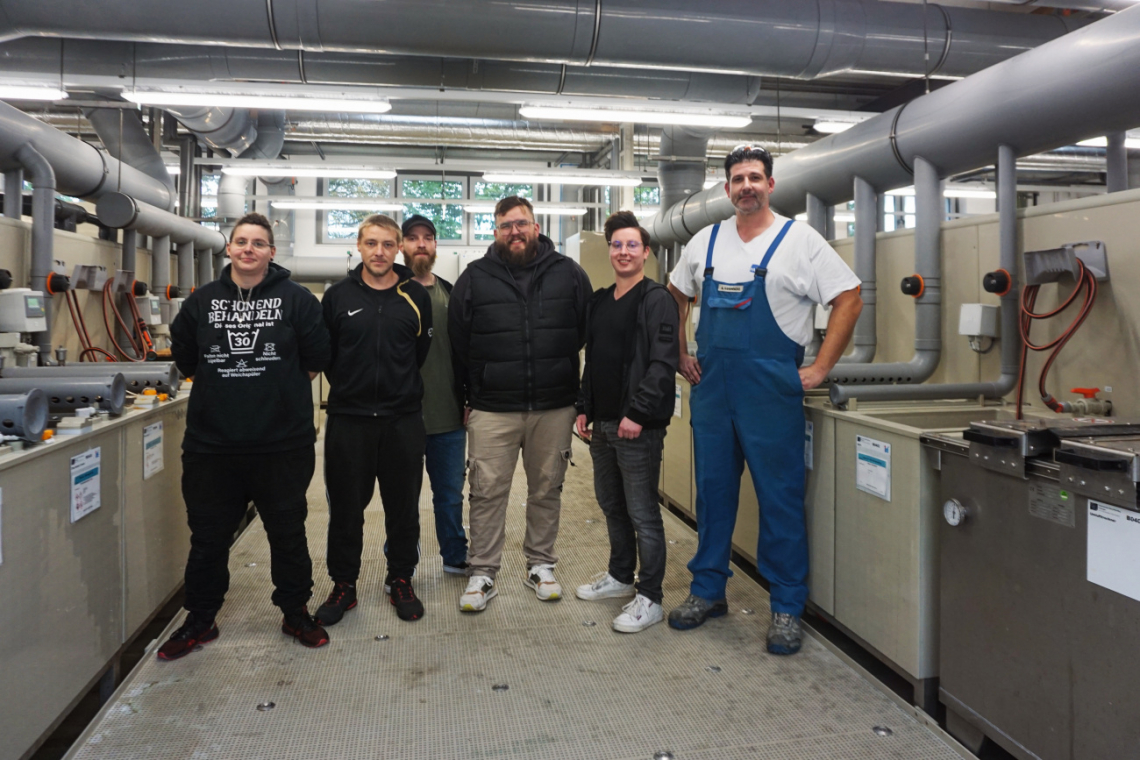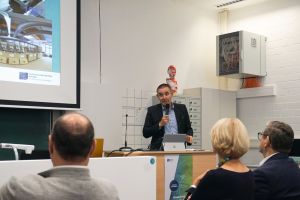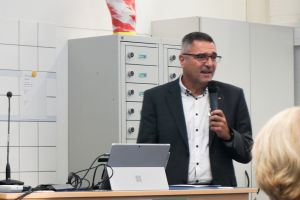A new chapter in the training of surface coaters in Germany was opened in Solingen at the end of September: The electroplating center, the most modern of its kind in Germany, ceremoniously opened its doors. Despite the autumnal, windy weather, numerous electroplating companies, politicians and association representatives came to the center's new location on Blumenstrasse. The opening marked the culmination of a seven-year project involving investments of 5.6 million euros, which was repeatedly put to the test by challenges such as the coronavirus pandemic.
Comprehensive possibilities
The new electroplating center has a state-of-the-art technical centre, new classrooms, the renovated dormitory and the modernized analytical laboratory. The centerpiece is the technical center, which boasts extensive technical equipment. Students, future master craftsmen and technicians have the opportunity to carry out a variety of coatings, including copper plating, nickel plating, chrome plating, silver plating and galvanizing as well as the deposition of alloys such as zinc-nickel, brass and bronze. The variety of electrolytes available is also remarkable. From semi-bright nickel and bright nickel through electroless nickel and nickel strike to acidic and cyanide copper electrolytes as well as acidic and alkaline zinc-nickel - all common variants are available in multiple versions. The only thing the students currently have to do without is mechanical pre-treatment. However, this is currently under construction.
 Modern equipment and modern facilities for contemporary training with a strong practical focus Right: The electroplating of workpieces was omnipresent for the visitors during the tour of the technical centre
Modern equipment and modern facilities for contemporary training with a strong practical focus Right: The electroplating of workpieces was omnipresent for the visitors during the tour of the technical centre
The technical center, which was built by Oberflächen- & Elektrotechnik Scheigenpflug GmbH from Leipzig, is a masterpiece of modern technology. Despite the extensive equipment, however, some compromises had to be made in order to save both space and costs. For example, steel and non-ferrous metals share the degreasing units, and the cyanide electrolytes are housed in one line in order to optimize the piping to the waste water system. Nevertheless, the technical center impressed the numerous visitors, including many industry representatives, with its forward-looking orientation. In addition to steel and non-ferrous metals, aluminum, die-cast zinc and, of course, plastics are also included in the pre-treatment process, which once again underlines the versatility of the center.
Focus on training and digitalization
A particular highlight of the event was the opportunity to look over the shoulders of the trainees at work. In live demonstrations, they showed visitors how various parts are electroplated. Among them was Dennis Hoch from Grohe, who willingly shared his skills and specialist knowledge of the various coatings with the guests.
Thanks to a variety of technical aids, including OneNote documentation, Wi-Fi throughout the site and a timetable app, as well as virtual meeting rooms, teaching is kept at a modern level. Trainees use tools such as Teams, Moodle and Office 365 and can bring their own devices into the classroom. Dr. Markus Richert is also creating additional learning videos to support the digital lessons. With four times three hours in the electroplating technical center, the trainees have plenty of time to learn the practical skills of the profession, which they can demonstrate in the final exams on May 13.
Importance of the electroplating center
Prior to the extensive tour of the technical center, chemistry laboratory and classrooms, the importance of the training center was emphasized during the opening speeches. In their welcoming speeches, Tim Kurzbach, Mayor of Solingen, and Jörg Püttbach, Chairman of the German Surface Technology Association (ZVO) and CEO of the BIA Group, emphasized the immense importance of the new center for the region and the entire industry. Frank Tischlinger complemented the ceremonial speeches with a presentation on modern training at the school, but also addressed problems: Only three technicians are currently being trained in Solingen. Nationwide, there are currently only 13 - a low point in the training of these valuable specialists. Tischlinger called for training in companies to be intensified and for trainees to be sent to Solingen.
 TBK school director Michael Becker welcomed the numerous guests in Solingen
TBK school director Michael Becker welcomed the numerous guests in Solingen
Also important: training with equipment and workpieces from the companies in order to come as close as possible to the industrial realities. Regular donations from the electroplating companies are required here. Tischlinger showed a selection of sheet metal components, replacement frames, belt buckles and POP sample plates that the trainees can currently work with. In his speech, the head of the technical college and surface technology also emphasized the strong support of the sponsoring association, which is sponsored by more than 20 electroplating companies and suppliers and plays a key role in financing the lecturers' work.
Bernhard Gaida shaped training
The history of electroplating technology at the Technical Vocational College (TBK) in Solingen goes back to 1957, when training began in House 1. Later, Bernhard Gaida - also known for his numerous textbooks published by Leuze Verlag - played a key role in shaping the training facility. The first electroplating training center was inaugurated in 1975. A new training center with its own waste water system followed in 1987, but this no longer met later requirements. The planning process for the new electroplating center began in 2017, and the project was successfully completed in 2024 thanks to significant funding from subsidies. The extensive modernizations include the digitalization of teaching, modern hazardous material cabinets and state-of-the-art waste water and exhaust air systems. One particular innovation is the ability to metallize plastics in the new center.
With a total budget of 5.6 million euros, which was financed by donations from industry and state subsidies, the electroplating center in Solingen is the most modern training location for surface technology in Germany. With 235 square meters of main space and an additional 94 square meters in the basement, the center offers optimal conditions for the next generation of surface coaters.
Looking to the future
Solingen relies on its own companies and talent. Mayor Tim Kurzbach emphasized in his speech: "Don't let the fatalism in society infect you." The city continues to believe in young people who want to embark on an apprenticeship.
The new electroplating center is part of a comprehensive funding project supported by both the state of North Rhine-Westphalia and the Federal Ministry for Economic Affairs and Energy. Since the beginning of the year, the prospective specialists have been taught in the modern training and classrooms. The dual training system in particular, which is known in Germany for its practical relevance, was the focus of the event. Currently, 143 trainees from ten federal states are being taught at TBK Solingen.
In his speech, Jörg Püttbach emphasized the importance of training skilled workers at an early stage: "Today there is a shortage of people that we didn't train in the past!" He emphasized that the industry must provide long-term training in order to avoid having to react to a shortage of skilled workers. Advancing digitalization also plays a key role in training: Lessons are organized digitally and learners have access to a video archive with over 80 instructional videos on the basics of surface technology. In addition, virtual classrooms have been set up to be used if students are unable to attend face-to-face lessons due to illness.
Milestone for the industry
The opening of the new electroplating center represents a milestone for the future of surface technology in Germany. Solingen now offers not only state-of-the-art technical equipment, but also a first-class training environment that meets the requirements of the industry. The event itself was characterized by an almost familiar atmosphere, as it coincided with the annual "Galvanotag". This provided a welcome opportunity to meet up with old companions, reminisce and raise a glass together to the future challenges facing the industry, of which there should be no shortage.











